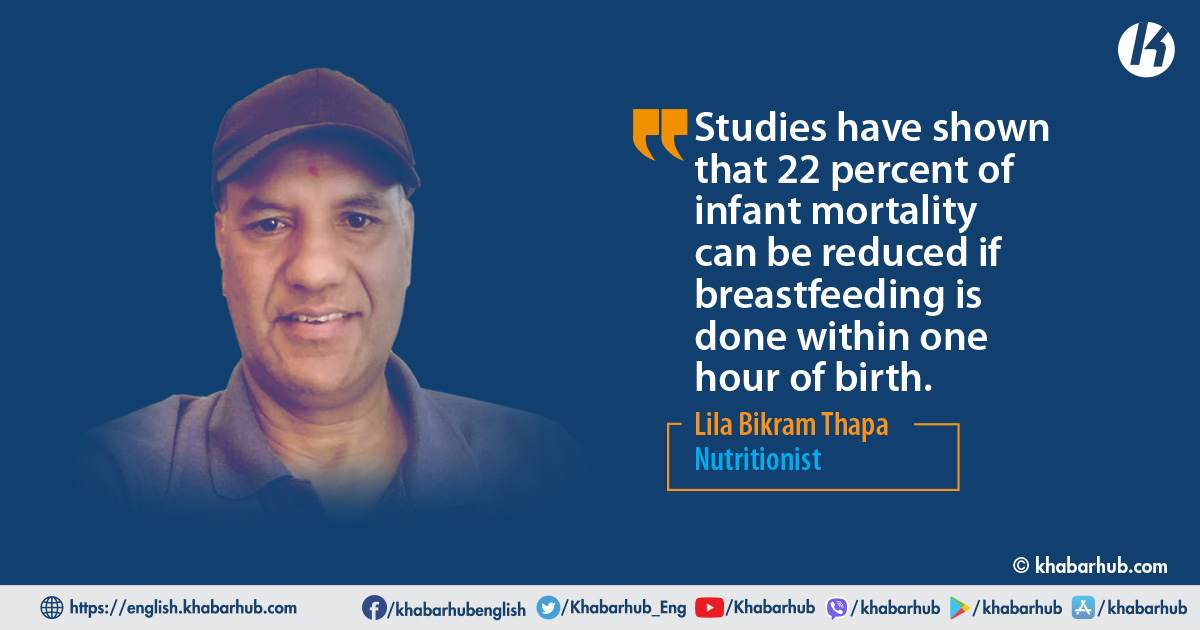0%

KATHMANDU: World Breastfeeding Week is underway. This week is celebrated worldwide from August 1 under the leadership of the World Health Organization and UNICEF to encourage mothers to breastfeed their babies.
On this occasion, more than 170 countries, including Nepal are holding various public awareness programs for one week.
This year’s Breastfeeding Week started with the slogan “Let’s help raise public awareness to promote breastfeeding”.
World Breastfeeding Week was first celebrated in 1992 by the World Alliance for Breastfeeding Action from 1 to 7 August.
UNICEF celebrates WHO, individuals, organizations, and their partner organizations including governments with the aim of re-establishing a global breastfeeding culture and providing support for breastfeeding at all times.
After delivery, the mother’s yellow colostrum is very nutritious and healthy.
Experts have said that since all the nutrients required by a 6-month-old baby are available in sufficient quantity in mother’s milk, breastfeeding should be started within half an hour after birth and breast milk should be fed 8 to 10 times in 24 hours.
Mother’s milk increases immunity in the health of the infant. However, in recent times, many people do not breastfeed their babies as it will spoil their beauty.
There are misconceptions such as loss of beauty, loss of body weight, and deterioration of breast size while breastfeeding.
What is the latest breastfeeding situation in Nepal? How is the nutrition branch working?
Edited part of the interview conducted by Beena Neupane for Khabarhub with Lila Bikram Thapa, Head of Nutrition Branch under Family Welfare Division:
World Breastfeeding Week is starting, how is it being celebrated in Nepal?
We have allocated a budget to 753 local levels to celebrate World Breastfeeding Day in Nepal. We will do various activities for a week and discuss the topic of breastfeeding.
Nepal is participating in this campaign by participating in programs in the country and outside the country. At the federal level (Rosa Unisius), we organized a program (World Breast Feeding Week Event) at the SAARC Secretariat with the Secretary, Unisius Rosa, and Belli of the Regional Office of UNICEF and experts from various ministries and departments.
Earlier, we established a ‘Breast Feeding Bank’ at Charity Obstetrics and Gynecology Hospital. We are starting to feed one mother’s milk to about 6,000 children in a year by adopting various processes.
We have prepared to visit different places till the 22nd of July to see how to promote breastfeeding and how to take it forward in different hospitals, such as Matri Shishu Hospital, Union and State Hospitals.
The slogan of this campaign is “Help to increase public awareness to increase breastfeeding” in Nepal.
When this breastfeeding week begins, all bodies seem to work with enthusiasm. But, apart from that, there seems to be silence at other times. What has this nutrition branch done at other times?
This is a campaign. Studies have shown that 22 percent of infant mortality can be reduced if breastfeeding is done within 1 hour of birth in the hospital as mother-child friendly.
We have arranged for the companion of the mother’s choice to stay with her when she is taken to give birth. We have been organizing programs in hospitals to announce the Matri Shishu Friendship Campaign.
In order to protect and promote breastfeeding in Nepal, there are laws and regulations of the provisions of the Sale and Distribution Act 2049 and 2051, which replaces mother’s milk.
Up to the local level, as a mother and child-friendly health organization, we have regularly conducted these programs so that mothers breastfeed within 1 hour of birth, only breastfeed for 6 months, and then feed more food.
There is an allegation that this program is focused in urban areas. Is it true?
We have been organizing programs in coordination with various agencies at each local level. For its promotion, we have done programs from making banners to broadcasting on FM radio.
Stakeholder interaction on breastfeeding promotion, protection and support is being held this Thursday. What is the current situation? We are planning how to move forward.
It is said that it is not possible to get the return according to the expenditure, even the understanding people are not breastfeeding. How can this situation be changed?
Breastfeeding awareness programs should be increased. Ban on sale and distribution of breast milk substitutes. Now, we have done the work of appointing inspectors at the central state and local levels by the Ministry of Health.
There are eight events through that inspector. We do this by bringing various subject experts from one province to Kathmandu. In the other 7 provinces, we have conducted a campaign to ban and punish the sale and distribution of breast milk substitute products by training the teachers there on how to protect it.
They say that the sale and distribution of products that replace mother’s milk will be banned. Is it possible to say this?
We are starting this year. It will be reduced gradually. We have planned to reduce the infant mortality rate to the lowest level by providing vaccines at affordable prices. We have set a goal that more than 90 percent of mothers will breastfeed by 2030.
Do you have anything to suggest?
Mother’s milk is like nectar for a baby. A baby should be breastfed from 1 hour after birth and up to 6 months.
Regular feeding of adequate amounts of breast milk for 6 months can prevent 13% to 22% of infant mortality.
So regular breastfeeding has multiple benefits for both mother and baby. Making a healthy baby by breastfeeding today means that we can prepare healthy and competent manpower for individuals, families, society and the country tomorrow.